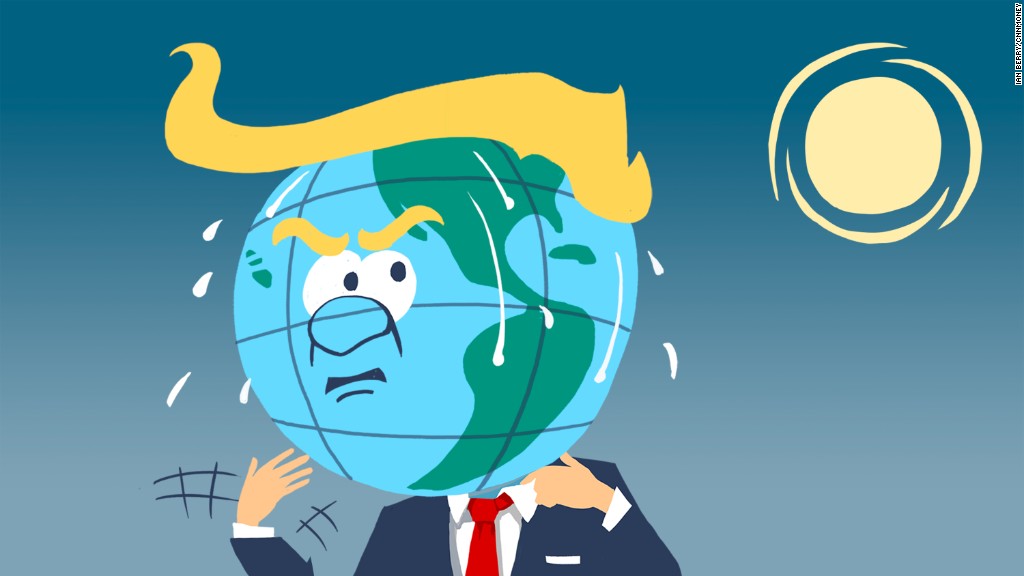
Saturday, April 29, will mark President Trump's 100th day in office. But will it also mark Day 1 of a government shutdown?
It will if Congress doesn't pass a spending bill soon that authorizes funding for the federal government -- and if the president doesn't sign it.
The current temporary spending bill -- a so-called continuing resolution -- expires on April 28. But there are still five months remaining for this fiscal year that need funding.
It certainly won't look good if the government shuts down on Republicans' watch, since they control both Congress and the White House, especially given questions about their ability to govern in the wake of the party's recent failure to accomplish its No. 1 goal: Obamacare repeal.
"Republicans do not want a shutdown. Oh my God, they don't want that," said Steve Bell, a former senior staffer on the Senate Budget Committee.
Indeed, Senator John Cornyn, the assistant Republican leader in the Senate, said point-blank to reporters this week, "There's not going to be a shutdown."
But nothing is easy with the Trump administration or with budget debates in a highly divisive Congress.
Here are several issues that could stymie efforts to avert a shutdown by April 28:
Wall funding: If Republicans try to authorize funding for Trump's controversial border wall, that will be a no-go for Democrats.
"That will not stand," Senate Minority Leader Charles Schumer has noted.
As of this week, anyway, there are hints that top Republicans won't push to include money for the wall in the government funding bill, but may choose to under a separate vehicle.
Defense spending hike with domestic program cuts: President Trump is requesting a $30 billion increase for defense and homeland security. To offset that, he's proposing $18 billion in cuts to non-defense programs, which make up the smallest part of the federal budget.
Related: How Trump's budget cuts could hurt low-income Americans
That's also not going to work for Democrats, who want parity in spending levels for both defense and nondefense.
On the other hand, not increasing defense spending could become a major sticking point for defense hawks.
Planned Parenthood: Republicans were planning to strip funding for the health care services organization in their Obamacare repeal bill. Since that bill is dead for now, conservatives may push for a defunding measure in the CR. If they do, bye-bye Democratic votes.
"Speaker Ryan signaled it will not be in the House bill, though that will cost many GOP defections on the bill. That means the Democrats have even more leverage," Chris Krueger, a senior policy analyst at the Cowen Washington Research Group, said in a morning note.
Gorsuch confirmation: Bad blood might also poison the political well. If Senate Democrats filibuster the confirmation of Supreme Court nominee Neil Gorsuch, Republicans may break with tradition to enact rules that let them bypass the Democrats to confirm Gorsuch on a simple majority vote.
"That should be taken as a leading indicator for a 4/28 shutdown," Krueger said.
So what happens in a shutdown?
Threats of a shutdown are far more common than actual shutdowns. The last one occurred in October 2013, and the one prior to that was in late 1995. But in all instances, shutdowns are a waste of federal energy, time and resources.
Those that last a while also can take a toll on the economy and businesses' bottom line.
"Federal contractors don't get paid, they lay people off," said budget policy expert Stan Collender.
If it looks like a shutdown will occur, the White House budget office will work with federal agencies to determine which federal functions and employees are essential or "excepted." Those that typically make the grade pertain to health, safety and defense, but the White House has latitude in how broadly it defines "excepted."
Agencies and services considered non-essential -- such as federal museums and national parks -- will be shuttered until the shutdown is over. Hundreds of thousands of federal workers are likely to be furloughed without pay. Congress may decide after the shutdown to pay them for the time off anyway. But the financial disruption for them can be a problem if, like many Americans, they live paycheck to paycheck.
-- CNN's Ashley Killough and Ted Barrett contributed to this report


